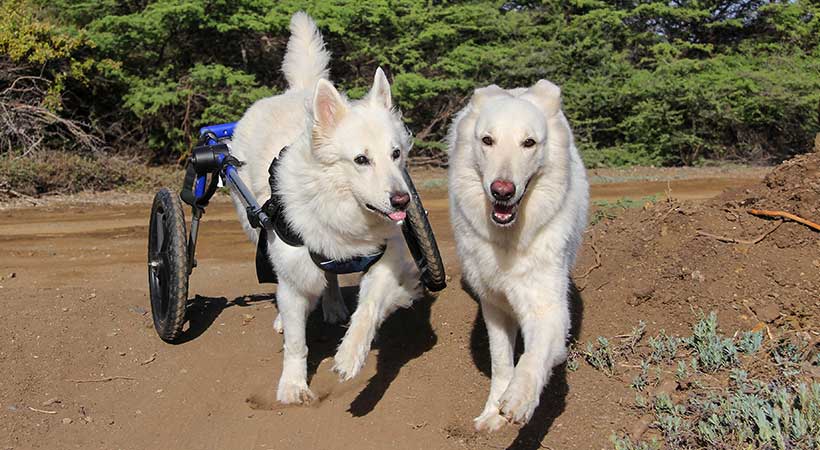If you are the owner of a disabled pet, you know that many people aren’t even aware that pets with special needs exist. But never fear, there’s help at hand! In this blog post, you’ll get the tips you need to know on how to begin to care for handicapped pets on a day-to-day basis – and they come straight from the mouths of people who have first-hand experience caring for animals with debilitating or chronic illnesses. Caring for such pets doesn’t have to be a burden. Done right, it can be a well of joy!
However, caring for a disabled pet can add extra levels of attention. It’s important to make sure you, the pet owner, take care of yourself as well. Here are tips to ensure that you have what you need in place as you embark on this special caretaker journey. It certainly can be a joy if you take the time to set a good foundation.
1) Build a Routine
The first and very best piece of advice when it comes to caring for a disabled pet is to establish a daily routine. For example, get up at 6 a.m., let out any other pets, dole out meds to the disabled pooch, perhaps check his blood sugar levels, feed everyone . . . you get the picture.
The thing is, by cultivating good habits and getting into a routine, it becomes so much easier to motivate yourself to take care of a special needs pet. After all, through continual practice, a lot of these actions will simply become second nature. It’s quite similar, actually, as caring for a young child!
Your pet, too, will appreciate the structure and routine you provide for him. He is less likely to get upset if he can more or less predict the actions that each day will bring.
2) Get a Second Opinion
A lot of disabled pets may be written off as lost causes unless you choose to challenge this. Don’t just take the word of your veterinarian as gospel (e.g., “Muffin will never walk or sit up or groom himself again”).
Instead, seek out the diagnosis of a neurological or other specialist. They may be able to offer innovative solutions and treatment plans that your veterinary generalist cannot.
Although these consultations may cost more, the information gained may give your pet a much better quality of life. Your pet’s treatment will also offer the specialists valuable experience and knowledge of what works and what doesn’t when it comes to treating future pets – and possibly humans! – with similar conditions.
3) Find a Support Group
This is another big one. Don’t try and deal with this on your own when you don’t have to!
Get onto the web and look for support groups in your area (whether on Facebook or other online platforms), to make contact with other pet owners in similar situations. A good place to start is the Walkin’ Pets Discussion Forum where pet owners discuss dozens of pet care topics.
It’s hard caring for a disabled pet when you feel like you are the only one out there and no one else can relate to you. By joining a support group, you will benefit from the encouragement and empathy given to you by others. Also, you will doubtless get some very useful, practical, hands-on advice as to how to care for your animal on a day-to-day basis from those who have already ‘been there, done that.’
4) Get Online
The internet contains a wealth of information on all manner of topics – including how to care for your disabled pet! Enter some relevant search terms in Google, and presto! You are sure to come across useful advice and pointers.
Again, by browsing around on the web, you may also find out what sort of resources are available in your area in terms of support groups, equipment, and more. You may also be able to pick up some useful equipment (wheelchairs, hoists, etc.), at a discount, or even for free, from pet owners who no longer need their gear.
Alternatively, you may be directed to small, local businesses that donate used equipment to those who need it. Used Dog Wheelchairs is a webpage for pet caretakers to buy, sell or donate dog wheelchairs and other sorts of equipment between themselves.
5) Call in the Reinforcements!
Ask for help from your veterinarian. If there is anything you are unsure about when it comes to the daily care of your pet, clarify things with your veterinarian first. (e.g., What is the best way to dispense medications to your canine friend? Hide it in their food, or deliver it in the form of those special, attractively flavored liquids that you can buy now?) Don’t be afraid to ask questions!
If you are lucky, your veterinarian may even be able to make in-home visits. This will be especially beneficial in the early stages of care when you are still learning everything and may feel overwhelmed.
It will help to have someone who can show you first-hand how to do certain things, such as lifting or transferring your pet, if that’s necessary. If your personal veterinarian doesn’t make home visits, go on the internet to see if there is another pet professional in your vicinity who can.
6) Look After Yourself!
To take proper care of your pet, you first need to take proper care of yourself! Feelings of sadness you may feel for your pet’s change of health, as well as the extra effort that may be required to care for a handicapped pet can greatly impact your mental well-being and thereby your capacity to take care of your animal.
Often, a simple change of mindset may be all that is needed. For example, instead of focusing on what you have lost, concentrate instead on the progress your loved one is making from day to day in regaining mobility and strength.
Also, besides availing yourself of a support group, don’t be afraid to ask friends and family for help when it is needed. Don’t try to do everything yourself!
At the end of the day, your pet will be a lot better off if you, the caregiver, take proper care of YOURSELF and are in a positive frame of mind.
Guest blogger Kent Foster is a long-time pet owner and animal lover. He runs the blog PupsBest.com to provide other pet owners with tips and advice on how to best care for their pets to provide the animals with everything they need to have happy, healthy lives.


Related Articles
Did we answer all your questions on "Disabled pet care"?










[…] a wheelchair is one of the best ways to take care of your disabled pet. As their owner, you’ll see how their disposition will improve with their range of […]